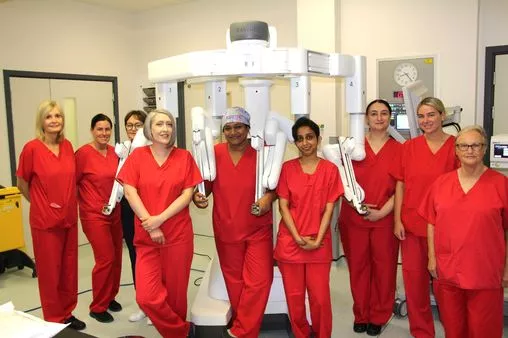Science
Robotic Surgeries Transform Cancer Treatment at North East Hospital

Patients at The James Cook University Hospital in North East England are experiencing significant improvements in recovery following robotic surgeries for cancerous tumours. This medical facility is celebrating a decade of pioneering robotic surgical techniques, having performed over 1,000 procedures since the introduction of the technology in 2015.
The hospital’s gynaecological surgeons are utilizing state-of-the-art robotic-assisted systems, including the da Vinci X and Xi, to provide patients with less invasive treatment options for complex cancer conditions. This advanced surgical approach allows for intricate operations through small incisions, significantly reducing pain and recovery time compared to traditional methods.
Benefits of Robotic-Assisted Surgery
Robotic-assisted surgery represents a substantial shift in the treatment of gynaecological cancers, such as ovarian and uterine cancers. Previously, these surgeries typically required large abdominal incisions, resulting in longer hospital stays, increased risk of infections, and higher blood loss. The new technique reduces these risks and enables faster patient recovery.
Patients often leave the hospital the day after surgery, with many reporting minimal pain and quick returns to daily life. The adoption of robotic technology has also allowed more hospital beds to become available, enabling healthcare providers to treat more patients while effectively managing waiting lists.
Consultant gynaecologic oncologist Anupama Rajan Babu emphasized the advantages of this technology, stating, “Robotic surgery allows us to treat complex cancer patients with greater precision, while offering them faster healing and recovery.” He noted that robotic surgeries save approximately £5,000 per patient when compared to traditional open surgeries, further alleviating pressure on the healthcare system.
Patient Experiences Highlight Robotic Surgery Success
Recent patients, including Sue Jeffrey and Annalisa Perry, have shared their positive experiences following robotic-assisted surgeries. Sue, a retired council leader, discovered a large lump in her abdomen in December 2024. Due to her past diagnosis of breast cancer, she was understandably concerned. A robotic-assisted procedure was performed to remove her cyst, requiring a hysterectomy and appendectomy to treat her ovarian tumour.
Sue described her experience: “I was unsure about what robotic surgery was at first but not worried at all because it was all explained very clearly, and it was great to hear that the recovery would be faster as a result.” She was discharged the following day with only five small incisions sealed with glue, a stark contrast to traditional surgery. “It felt amazing to go home the very next day after a major surgery,” she added.
Annalisa, who had been diagnosed with atypical endometrial hyperplasia in 2020, underwent a robotic surgery to remove a cancerous tumour following a biopsy in March 2025. She echoed Sue’s sentiments, stating, “The robotic surgery made a huge difference to my recovery. I felt no pain on the day of the surgery or after the procedure—it was just like a normal day, which is quite shocking considering I went through a major surgery.”
Both patients highlighted the significant impact of robotic-assisted surgery on their recovery times and overall experiences, with Annalisa noting that such advancements in technology will help free up beds within the NHS, allowing for quicker discharges and better patient care.
The NHS 10 Year Health Plan aims to further integrate technology into patient care, moving from analogue to digital solutions. By expanding the use of robotic-assisted surgeries at facilities like The James Cook University Hospital, healthcare providers are modernizing services, improving patient outcomes, and reducing variations in care across the country.
The success of robotic surgeries at The James Cook University Hospital not only showcases the benefits of advanced medical technology but also underscores the importance of patient-centered care in modern healthcare systems.
-

 Health3 months ago
Health3 months agoNeurologist Warns Excessive Use of Supplements Can Harm Brain
-

 Health3 months ago
Health3 months agoFiona Phillips’ Husband Shares Heartfelt Update on Her Alzheimer’s Journey
-

 Science2 months ago
Science2 months agoBrian Cox Addresses Claims of Alien Probe in 3I/ATLAS Discovery
-

 Science2 months ago
Science2 months agoNASA Investigates Unusual Comet 3I/ATLAS; New Findings Emerge
-

 Science1 month ago
Science1 month agoScientists Examine 3I/ATLAS: Alien Artifact or Cosmic Oddity?
-

 Entertainment5 months ago
Entertainment5 months agoKerry Katona Discusses Future Baby Plans and Brian McFadden’s Wedding
-

 Science1 month ago
Science1 month agoNASA Investigates Speedy Object 3I/ATLAS, Sparking Speculation
-

 Entertainment4 months ago
Entertainment4 months agoEmmerdale Faces Tension as Dylan and April’s Lives Hang in the Balance
-

 World3 months ago
World3 months agoCole Palmer’s Cryptic Message to Kobbie Mainoo Following Loan Talks
-

 Science1 month ago
Science1 month agoNASA Scientists Explore Origins of 3I/ATLAS, a Fast-Moving Visitor
-

 Entertainment2 months ago
Entertainment2 months agoLewis Cope Addresses Accusations of Dance Training Advantage
-

 Entertainment3 months ago
Entertainment3 months agoMajor Cast Changes at Coronation Street: Exits and Returns in 2025









